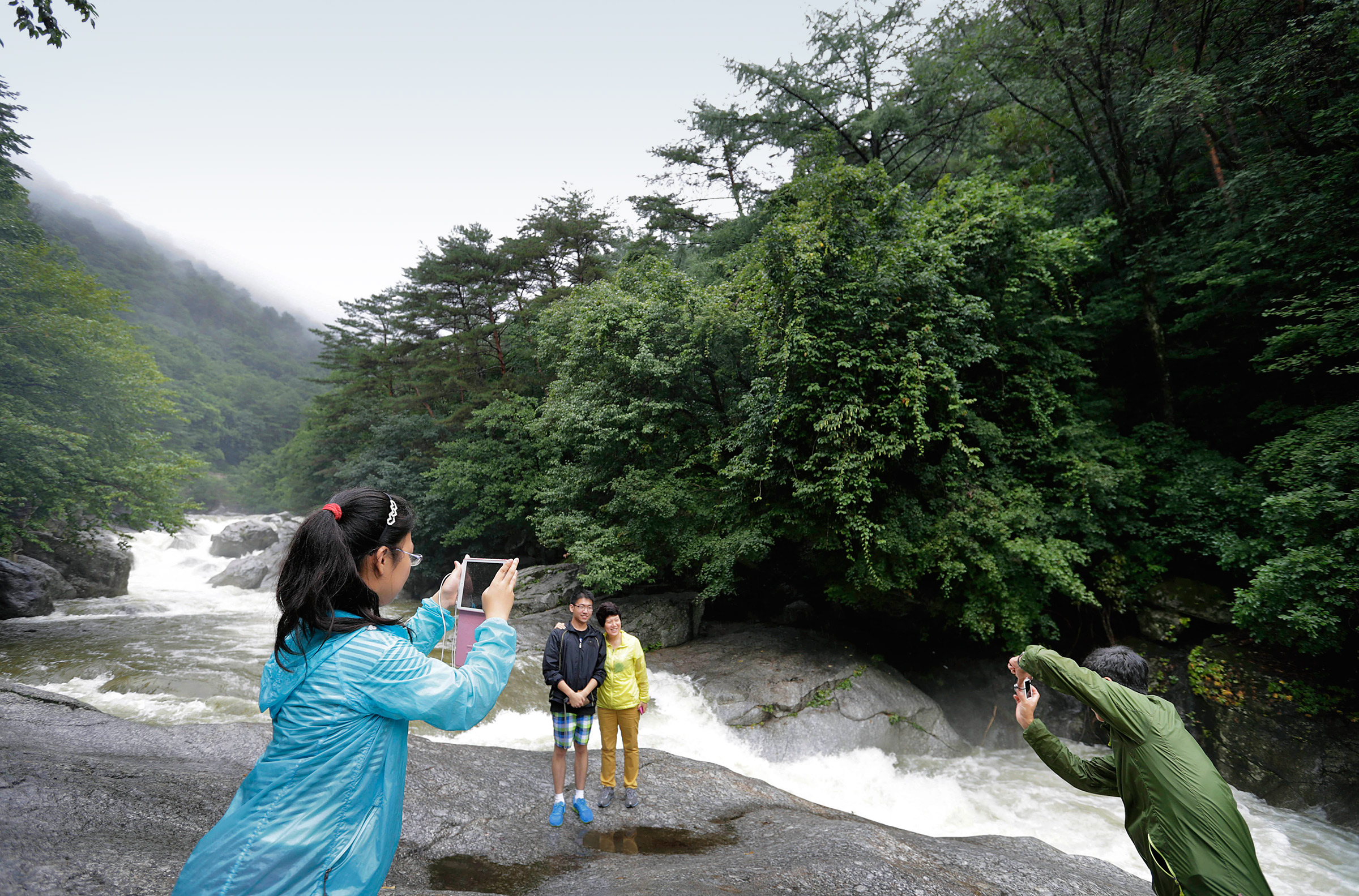
New Yorkers flock to ashrams in the Appalachian Mountains, Europeans to refurbished hermitages in the Umbrian countryside, but where do Asians go to get away from it all? Sure, there are Balinese yoga retreats and meditation centers run by Nepali beekeepers. But for a growing number of Chinese, the ultimate escape is the ultimate in oppression: North Korea.
To be clear, North Korea—a rogue state that probably has nuclear weapons—isn’t suddenly a land of milk-and-honey baths, and woe betide anyone who requests a chemical peel at a Pyongyang hotel. But a corollary of being the most isolated place on earth is utter sequestration from modern banes. And ever more Chinese visitors are, out of curiosity, making the short hop across the Yalu River at border town Dandong and going back for the relative serenity they find. “Without cell phone, computer or any modern communications, the feeling of isolation lets me find peace,” says history teacher Bai Xuejiao, 28.
Of course, Orwellian societal controls don’t lend themselves to a relaxing vacay, and the totalitarian regime of Supreme Leader Kim Jong Un isn’t known for its laissez-faire attitude even to holiday snaps. (Tour guides and government minders will tell you that only front-on and well-framed photos can be taken of founding father Kim Il Sung’s statue.) There are also serious ethical questions about funneling cash to what’s considered the world’s most repressive regime, under which 25 million people live under the imminent threat of “extermination, murder, enslavement, torture, imprisonment, rape, forced abortions and other sexual violence,” according to a 2014 U.N. report.
As such, organizing tours to North Korea remains a somewhat secretive industry, and none of the dozen Chinese tour operators contacted by TIME agreed to comment for this article. However, travel advertisements increasingly home in on the nation’s natural splendor. “The sea by North Korea is 100% clean, you won’t see any garbage,” claims an advertisement for Yan Bian Century tourism agency. “The whole of Rason City [on the Sea of Japan in North Korea’s northeast] is an organic place. Beautiful, gentle and shy North Korean girls will give you the memory of a lifetime.”
Tourism dollars have taken on new significance for the Kim regime since March’s ramped-up U.N. sanctions, which have made traditional methods of acquiring foreign capital—generally exporting coal and minerals—far trickier. From July, Chinese nationals could enjoy visa- and passport-free half-day tours from Dandong to the North Korean city of Sinuiju, right on the other side of the border. Already, 85% of all Chinese tourists to North Korea use this route. North Korea also has a plush ski resort at Masik Pass, boasting nine pistes, a luxury hotel, several well-heeled restaurants and a rental shop stocked with high-end gear—an attraction that only the country’s elites can afford.
Luxury, however, seems the opposite of what many Chinese visitors to North Korea seek. “I planned to make my son experience some hardship, but our North Korea trip gave me a new perspective,” posted one Chinese travel blogger. “Without wi-fi, we saw their simple lives and it eased our minds. We climbed the mountains and watched a waterfall. We are amazed by nature’s craftsmanship. It was truly natural and pollution-free.”
Other than pollution, food safety consistently ranks as a top concern among Chinese today, as an antiquated agriculture system struggles to feed 1.3 billion hungry mouths by adding more fertilizer to fields and cramming more hormone-pumped cattle into cages. This has led to a raft of food-safety scandals, and one of the greatest draws for Chinese visitors to North Korea is the perception that what they eat is chemical- and additive-free. “I trust food safety in North Korea as it is all organic,” says one Dandong-based Chinese trader who regularly travels all over North Korea. “I can feel the organic taste from potatoes and beans in North Korea, but in China you rarely get food like that.”
For the Chinese, though, much of North Korea’s allure is its resemblance to a simpler China, harking back to an era before mass industrialization and commercialization. “The idyllic scenery in North Korea is beautiful,” posted one user to China’s Twitter-like microblog Weibo. “When I saw the uniformed people riding bicycles, it feels like I am traveling through time.”
More Must-Reads from TIME
- Donald Trump Is TIME's 2024 Person of the Year
- Why We Chose Trump as Person of the Year
- Is Intermittent Fasting Good or Bad for You?
- The 100 Must-Read Books of 2024
- The 20 Best Christmas TV Episodes
- Column: If Optimism Feels Ridiculous Now, Try Hope
- The Future of Climate Action Is Trade Policy
- Merle Bombardieri Is Helping People Make the Baby Decision
Write to Charlie Campbell/Dandong at charlie.campbell@time.com